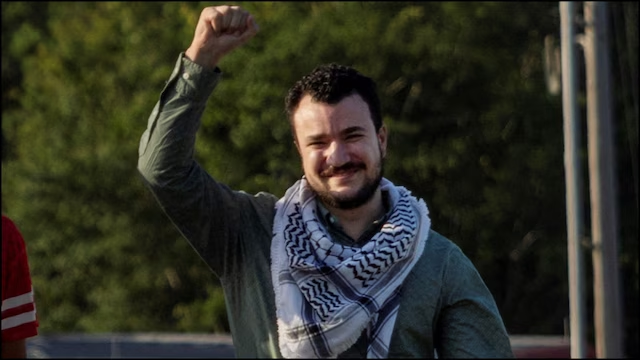Palestinian activist Mahmoud Khalil has been released from federal immigration detention after spending 104 days in custody. A judge ordered his release on Friday, ending a high-profile case that drew national attention. Khalil, a former graduate student at Columbia University, became a central figure in the Trump administration’s response to student protests.
He walked free from a detention centre in Louisiana and plans to return to New York. There, he will reunite with his wife and their newborn son, who was born during his detention.
“This shouldn’t have taken three months,” Khalil said outside the facility. “Justice prevailed, though it was long overdue.”
Legal challenge to Mahmoud Khalil’s detention and deportation efforts
The Trump administration is seeking Khalil’s deportation due to his involvement in pro-Palestinian protests. Authorities arrested him on 8 March at his apartment in Manhattan.
However, US District Judge Michael Farbiarz disagreed with his continued detention. He ruled that Khalil posed no flight risk and had not committed any acts of violence. The judge called the case “highly, highly unusual” and said the government had failed to justify the detention.
“Petitioner is not a danger to the community. Period, full stop,” the judge stated during a phone hearing.
Despite the ruling, the Department of Homeland Security said it would appeal. That same day, an immigration judge in Louisiana denied Khalil bond and ordered his removal. The agency stated on X that only immigration courts—not federal judges—should decide such matters.
Political reactions and free speech concerns
Khalil was the first person arrested under the Trump administration’s crackdown on student protests related to the conflict in Gaza. US Secretary of State Marco Rubio argued that Khalil’s presence could harm American foreign policy.
The administration maintains that non-citizens who criticise Israel in such protests should be deported. Officials have framed these demonstrations as antisemitic. However, civil rights groups argue this stance silences legitimate political dissent.
Judge Farbiarz blocked deportation on foreign policy grounds. Still, he allowed the government to continue its case based on claims that Khalil lied on his green card application. Khalil disputes this allegation.
Importantly, Khalil has not broken any laws. During the Columbia protests, he acted as a negotiator and spokesperson, not as a participant in any unlawful activity. His media presence made him a target for critics.
On Friday, the judge agreed with Khalil’s legal team. He said the detention restricted Khalil’s rights to free speech and due process. The court also recognised that Khalil has become a public figure.
Release conditions following Khalil’s detention
After his release, Khalil criticised the broader system that detained him.
“No one should be imprisoned for protesting a war,” he said. “Whether you’re a citizen or an immigrant, your humanity doesn’t change.”
Although Khalil must surrender his passport and cannot travel abroad, he will receive his green card and limited travel documents. These will allow him to visit family in New York and Michigan and attend court dates in New Jersey, Louisiana, and Washington, DC.
His wife, Dr Noor Abdalla, said she finally felt a sense of relief.
“This ruling doesn’t undo the damage,” she said, “but today we celebrate Mahmoud coming home.”
Wider implications
Khalil’s release follows the release of other student activists facing similar cases. These include Mohsen Mahdawi, Rumeysa Ozturk, and Badar Khan Suri students from Columbia, Tufts, and Georgetown respectively.
Their cases reflect growing concern over how the government responds to student activism and dissent, especially among non-citizens.
